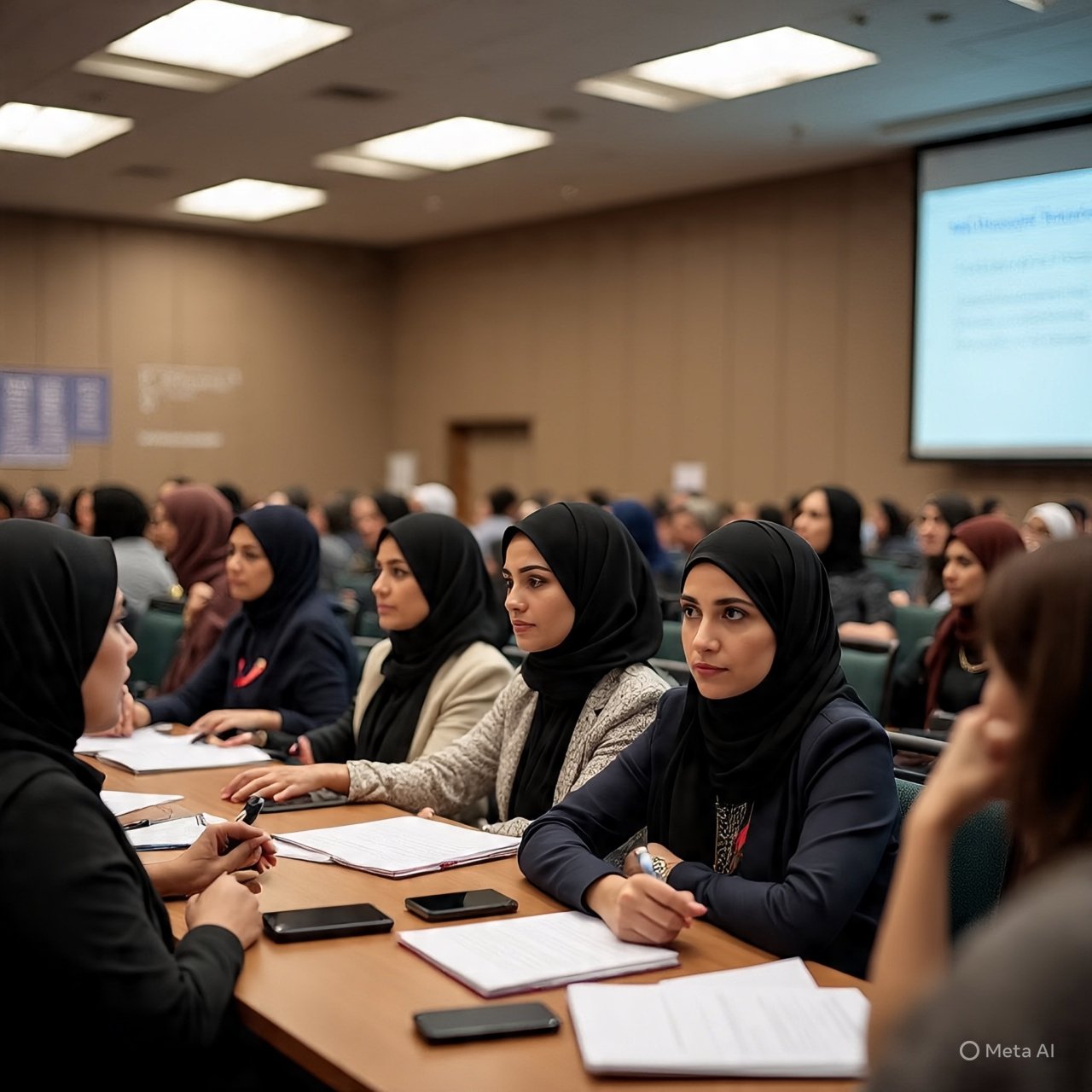New Fiqh Debates 2026: Virtual Reality & Metaverse
Introduction
Throughout human history, new windows of science and technology have opened in every era, and each new invention has affected different aspects of human life. In the current era, the rapid development of Virtual Reality (VR) and the Metaverse has not only shaken social, economic, and cultural structures but has also opened a new and vast field of religious and jurisprudential discussions. This digital universe, where humans can create a new identity through an avatar, is posing questions to Islamic jurisprudence that have never been encountered before. This article, under the title “New Fiqh Debates 2026,” will review these new challenges and attempt to present possible solutions to these modern issues in light of Islamic principles. This is a journey where centuries-old jurisprudential treasures will be harmonized with a digital world that is reshaping our real world with new meanings.
Jurisprudential Status of Metaverse: Reality or Illusion?
To understand the jurisprudential status of the metaverse, it is first necessary to determine whether it has real existence or is merely an illusion and imaginary world. In jurisprudential terminology, “reality” is that which has effects and consequences in the apparent world. Although the metaverse is a digital structure, its effects are completely real. The transactions conducted in it have economic impact, the worship performed there depends on intention, and the events occurring there deeply affect human psychology. Therefore, the metaverse cannot be ignored by considering it merely a “game” or “entertainment.” It is a kind of “virtual reality” whose rulings will be established according to its nature. Just as the rulings of things seen in dreams are different from the apparent world, but if a person commits a sin in a dream, they are not held accountable, however, if the same action is performed in the metaverse, where their will and intention are involved, its ruling will be different. This is why for jurists, this is a matter of examining a new type of “reality,” which requires new principles.
Worship in Metaverse: Digital Mosque and Hajj Avatar
Worship depends on the correctness of intention, conditions, and pillars. Praying in a virtual mosque in the metaverse is a complex issue. If a person, being in a state of ablution in the real world, facing the Qibla, and performing the movements and postures of prayer through an avatar inside the metaverse, will the ruling of this prayer be the same? According to most jurists, physical performance of prayer is necessary, whereas here there is a lack of physical movements. However, there is permission for disabled people to pray with eye gestures, so can avatar gestures also be placed in the same category? Similarly, the concept of Hajj in the metaverse creates more serious problems. Can performing Tawaf around the Kaaba through an avatar be a substitute for the blessing of Hajj? Obviously not, because physical presence in Makkah Mukarramah is the primary condition for Hajj. However, this technology can prove to be an excellent means for Hajj preparation and education, where people can learn Hajj rituals virtually. This opens a new path for teaching and training of worship without changing the basic rulings of worship.
Marriage and Divorce in Metaverse: Digital Marital Relations
In the metaverse, two people can “marry” each other through their avatars. From a jurisprudential perspective, marriage requires conditions such as Sharia words, witnesses, and presence of a guardian. Can words exchanged between two avatars be considered a Sharia marriage? Generally no, because an avatar is a virtual existence, while marriage relates to real individuals. It will be considered merely a “game” or “social interaction,” provided it does not involve any Sharia-prohibited act. Similarly, if a person utters words of divorce through their avatar, will it have any Sharia effect in the real world? Since intention and will are fundamental, if their intention is to give a real divorce and the conditions are present, it is possible that some jurists may consider it effective, which could result in extremely serious problems. Therefore, it is necessary for Muslims to observe Sharia limits in this digital world as well and not take such matters lightly.
Digital Economy: Sharia Status of NFT and Crypto
The economy of the metaverse runs on blockchain, NFTs (Non-Fungible Tokens) and crypto currencies. NFTs are actually a means of proving ownership of digital assets, such as virtual art or property. From a Sharia perspective, ownership of something is not proven until it meets the definition of “property,” meaning it has the capacity to be beneficial and possession over it is possible. NFTs have the aspect of being beneficial, but the matter of possession is different because it is merely a digital certificate. Is this “valuable property”? Jurists may differ on this. Similarly, there is intense debate ongoing in the Muslim world regarding the Sharia status of crypto currencies. Do they belong to the category of coins? If yes, then they should have the conditions of currency (such as backing by gold and silver). For all these new economic tools, Islamic jurisprudence will have to present new interpretations of its economic principles (such as prohibited interest, uncertainty, and gambling) so that Muslims can participate in this new digital economy in a halal manner.
Hijab and Purdah: Avatar Identity and Sharia Purdah
Hijab and purdah are important commands in Islam related to covering a woman’s adornment from non-mahrams. In the metaverse, a user can choose their avatar’s appearance, clothing, and even gender themselves. The question arises whether it is permissible for a Muslim woman to enter the metaverse with a male avatar? Or dress her avatar in fashionable but Sharia-violating clothing against purdah? Since the avatar represents her, she is responsible for all its actions and deeds. Therefore, the avatar’s clothing and its interaction will also be subject to Sharia commands. A woman adopting a male avatar could actually fall under the category of “imitating men” (tashabbuh bil-rijal), which is impermissible. Similarly, the avatar being uncovered in front of non-mahrams would also be against Sharia purdah. Therefore, it is necessary for Muslim users entering the metaverse to respect Sharia limits through their avatars as well.
Crime and Punishment: Ruling on Theft and Harassment in Virtual World
Crimes also occur in the metaverse. Harassing someone’s avatar, “stealing” someone’s virtual property (through hacking), or making them target of virtual violence. The question is whether any hadd (prescribed punishment) will be imposed on such digital crimes under worldly Sharia laws? To apply the hadd for theft, the condition is that the stolen item must be “valuable property” and taken from a protected place (hiraz). Is an NFT or crypto wallet a “hiraz”? If yes, then hacking it could fall under the category of Sharia theft, provided the value of that property is determined. Similarly, the act of harassment, although not physical, has real psychological impact, therefore it will fall under “ta’zeer” (discretionary punishment by judge). To deal with these crimes, not only will jurisprudential rules need new interpretation but there will also be a need to create digital laws at state level that conform to Sharia principles.
Intention and Will: Motivation of Action in Digital World
Intention holds central importance in Islamic law. “Actions are judged by intentions.” The metaverse is a world where humans can hide their real identity. In such case, how will their intentions be judged? If a person creates an avatar for praying in the metaverse, but their intention is for show, then this act will fall under the category of “riya” (show-off) and will be rejected before Allah. Similarly, if they do something bad to someone and their intention is to harm them, even if the act is virtual, they will be guilty of sin. Therefore, every Muslim entering the metaverse will have to account for their intentions. This digital world is not merely a “game” where commands are suspended. Rather, it is a new field for human moral and religious testing, where their will and intentions will be the basis for acceptance of their actions.
Islamic Identity: Concept of Ummah Unity in Metaverse
The metaverse is a global village where people of different religions and cultures meet. In such case, how will Muslims maintain their Islamic identity? Is it necessary for them to build a separate “Islamic metaverse”? Or should they establish their mosques, gatherings, and educational centers while living in the general metaverse? This is an important question. Historically, whenever Muslims went to any new land, they established their places of worship and social centers. Similarly, there is a need to establish a “digital Ummah” in the metaverse, where Muslims can discuss their religious issues, seek guidance from scholars, and display brotherhood with each other. This will not only maintain their identity but will also prove to be an effective means of Islamic da’wah and propagation.
Formation of Modern Fiqh: New Doors of Ijtihad
In the face of new issues like the metaverse, Islamic jurisprudence does not have the option to remain static. For this, the door of “ijtihad” must be kept open. Ijtihad means finding solutions to new events and issues while keeping the basic principles of Quran and Sunnah in view. For the issues of metaverse, jurists should adapt their思维方式 according to modern requirements. They will have to work together with computer scientists, neuroscientists, and ethics experts so they can gain complete understanding of this new technology. After that, they will be able to present solutions to these issues by using the general principles of fiqh such as “la darar wa la dirar” (no harm and no counter-harm), “al-darurat tubih al-mahzurat” (necessity makes prohibited things permissible), and “al-urf” (custom) in new contexts.
Family Relations: Digital Parents and Children’s Rights
Another unique concept in the metaverse is that of “digital children” or “AI children,” where people can raise avatars run by artificial intelligence as their children. From a jurisprudential perspective, is it necessary to spend on such digital beings like real parents? Is treating them with kindness and justice obligatory? Although this children are not real, Islam commands kindness to every living being and even inanimate things. Therefore, mistreating these digital beings or using them for bad purposes would not be correct. Similarly, if a person spends all their time and money on this digital family and neglects the rights of their real family, this would be impermissible. Therefore, maintaining balance in priorities is essential.
Muslim World Unity: Opportunities for Solidarity in Metaverse
The metaverse is also a golden opportunity for unity and mutual cooperation for the Muslim Ummah. Scholars, students, and ordinary Muslims from the entire Islamic world can gather in a virtual hall and discuss important issues. International Islamic universities can be established in the metaverse instead of online conferences, where students can feel real interaction with each other. Awareness campaigns and demonstrations can be run in the metaverse to spread awareness about global Muslim issues (such as Palestine, Kashmir). This digital world can actually eliminate geographical boundaries and give new power to the Muslim Ummah, provided it is used for positive purposes.
Education and Training: New Walls of Islamic Sciences
The metaverse can bring about a revolution in the field of Islamic education and training. Students can see important historical events virtually, for example, understand the scenes of the Prophet’s battles through a simulation. Difficult subjects like syntax and morphology can be made easier through interactive games. A virtual environment can be created for Huffaz for Quran memorization where their performance can be checked through AI. All these possibilities expand the scope of education. However, it is necessary to ensure that these digital means cannot substitute the traditional spiritual connection between teacher and student. They are merely supportive tools, not the goal.
Ethics Front: Artificial Intelligence and Islamic Ethics
The foundation of metaverse and VR is artificial intelligence (AI). AI is a powerful weapon that should be used within the framework of Islamic ethics. For example, if a Muslim developer creates an AI application that can answer jurisprudential questions, they must ensure that these answers are based on the statements of reliable scholars and do not spread any wrong information. Similarly, developing AI that encourages people towards sins, such as virtual dating apps, would be completely impermissible. Therefore, both Muslim developers and users have the responsibility to view this technology through the lens of Islamic ethics and think at every step whether this action will become a means of attaining Allah’s pleasure.
Future Jurisprudential Landscapes: An Insightful Review
In 2026 and subsequent years, these jurisprudential discussions will become increasingly deeper and more complex. As technology advances, new questions will emerge. For example, if the human brain connects directly to computer (Brain-Computer Interface) and they start working in the metaverse through their thoughts only, how will the issue of intention and will be resolved? Or, if artificial intelligence advances so much that it starts giving jurisprudential decisions autonomously, will it be accepted as a “mufti”? To answer these questions, Islamic jurisprudence will have to step out of its traditional boundaries and enter the broader realm of theology and philosophy. This is both a challenge and an opportunity to prove Islam’s universality and its ability to guide humanity in every era and every circumstance.
Conclusion: The Path of Balance
Finally, it can be said that the journey of virtual reality and metaverse is a new test for humanity. Islam’s temperament has always been of balance and moderation. This technology is neither something to be completely rejected nor to be lost in without thinking. It is necessary for Muslims to enter this new world, benefit from its advantages, but keep their religious principles and moral values in front at every moment. There is a need for strong connection between scholars and technologists so they can together build a digital future that is subject to Islamic Sharia and proves to be a mercy for humanity. This is the true purpose and intention of “New Fiqh Debates 2026.”


